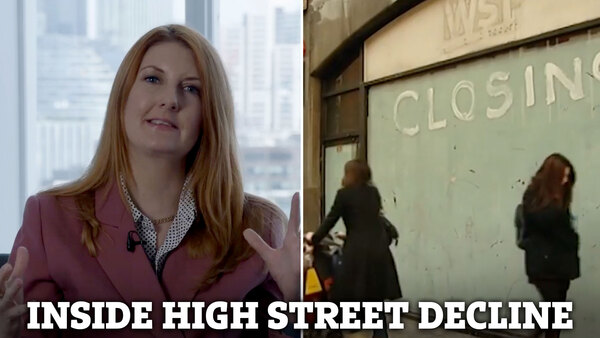M&S abruptly closes flagship city centre store after 81 years in blow to shoppers


M&S has abruptly shut a flagship city centre store ahead of schedule in a blow for shoppers.
The posh retailer has shuttered the location in central Aberdeen, Scotland.
The store in St Nicholas Street, which opened over eight decades ago, welcomed in customers for the final time on Saturday (May 3).
M&S had previously said the flagship store would close in the summer.
But it's not all bad news for Aberdeen residents, as M&S opened a new branch in Union Square in the city in April.
Luke Smith, M&S Aberdeen store manager, said: “While we closed our St Nicholas Street location a little sooner than expected, our commitment to serving the Aberdeen community remains steadfast at our fantastic new Union Square store.
“Here, customers can continue to expect the great quality M&S is known for, alongside the trusted value they rely on.
"Plus, with our expanded food hall, they’ll discover an even wider range of delicious products to enjoy."
In any case, shoppers and locals have been left gutted after finding out the St Nicholas Street store has shut for good.
Posting on Facebook, one said: "Aberdeen has totally lost it’s sparkle it is so sad it was once a nice vibrant place but not anymore."
A second said: "That’s super sad. I loved Markies.
"Left Aberdeen 40 years ago and I’ve never been in the new store but I loved Markies in St Nicholas Street."
Meanwhile, a third commented: "Aberdeen is a ghost town now."
The closure comes with M&S in the process of majorly shaking up its store estate across the UK.
The retail giant is opening six new locations while giving 11 existing shops a makeover in London as part of a £90million project.
The first of the 11 refurbished stores opened in Clapham South at the end of last month.
M&S said the £90million investment would build on a further £30million investment pumped into its London stores last year.
Meanwhile, the retailer is pumping £50million into opening five new stores and renovating three in the North West of England.
New stores are set to open in Liverpool and Lancashire, subject to planning approval.
It's common practice for larger-scale retailers to open and close branches based on customer demand and sales.
But bigger chains still shut thousands of stores between them in 2024, with more set to close in 2025.
The Centre for Retail Research found 2,138 shops were shut by larger chains last year.
Meanwhile, 11,341 independent stores were shut across the year.
The centre predicts 17,350 shops in total will close in 2025, linking the rise to hikes in employer National Insurance contributions and the national minimum wage.
Some retailers have warned products will rise in price to offset the added costs too, including M&S and Greggs.
EMPTY shops have become an eyesore on many British high streets and are often symbolic of a town centre’s decline.
The Sun's business editor Ashley Armstrong explains why so many retailers are shutting their doors.
In many cases, retailers are shutting stores because they are no longer the money-makers they once were because of the rise of online shopping.
Falling store sales and rising staff costs have made it even more expensive for shops to stay open.
The British Retail Consortium has predicted that the Treasury's hike to employer NICs from April 2025, will cost the retail sector £2.3billion.
At the same time, the minimum wage will rise to £12.21 an hour from April, and the minimum wage for people aged 18-20 will rise to £10 an hour, an increase of £1.40.
In some cases, retailers are shutting a store and reopening a new shop at the other end of a high street to reflect how a town has changed.
The problem is that when a big shop closes, footfall falls across the local high street, which puts more shops at risk of closing.
Retail parks are increasingly popular with shoppers, who want to be able to get easy, free parking at a time when local councils have hiked parking charges in towns.
Many retailers including Next and Marks & Spencer have been shutting stores on the high street and taking bigger stores in better-performing retail parks instead.
In some cases, stores have been shut when a retailer goes bust, as in the case of Carpetright, Debenhams, Dorothy Perkins, Paperchase, Ted Baker, The Body Shop, Topshop and Wilko to name a few.
What's increasingly common is when a chain goes bust a rival retailer or private equity firm snaps up the intellectual property rights so they can own the brand and sell it online.
They may go on to open a handful of stores if there is customer demand, but there are rarely ever as many stores or in the same places.
The Centre for Retail Research (CRR) has warned that around 17,350 retail sites are expected to shut down this year.
Do you have a money problem that needs sorting? Get in touch by emailing [email protected].
Plus, you can join our Facebook group to share your tips and stories